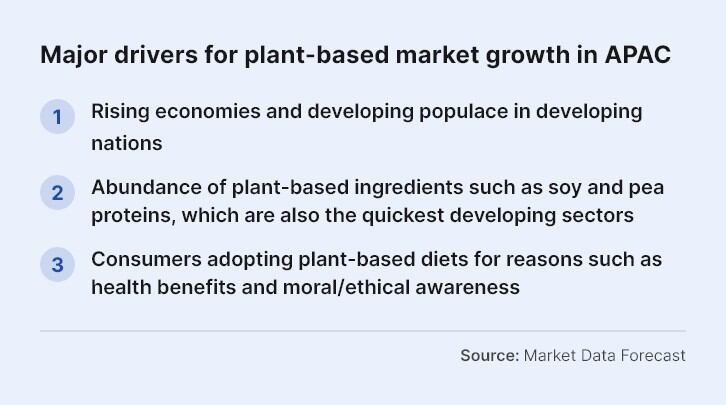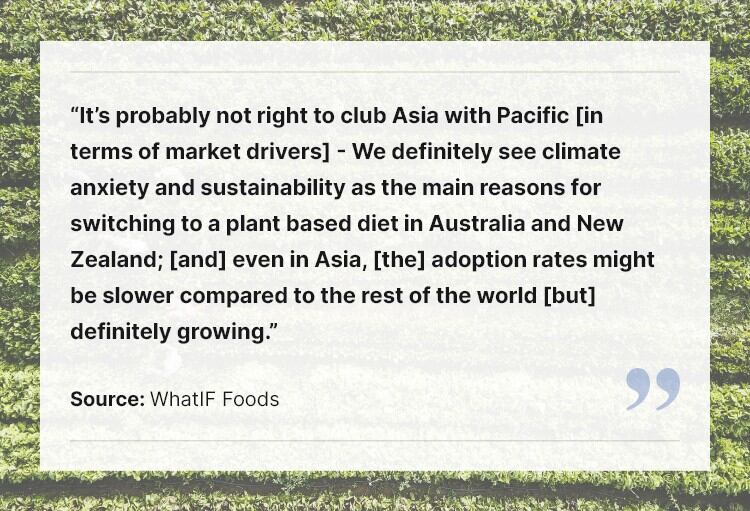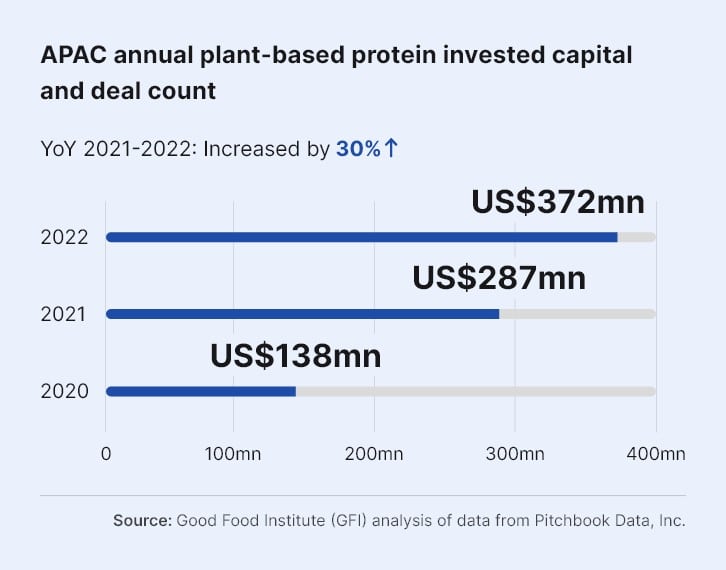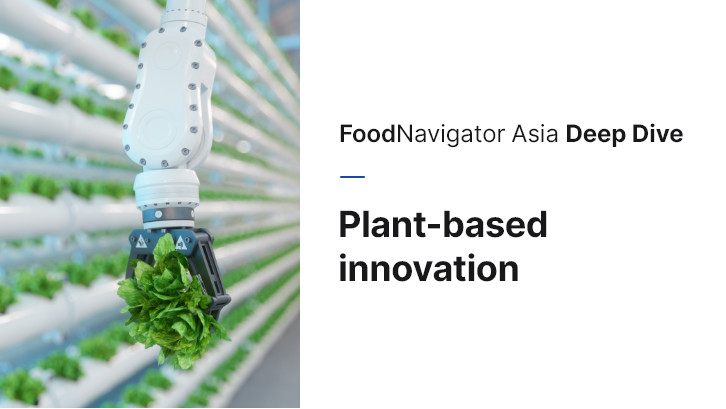Although the plant-based products sector has seen some of the most exponential growth in the global food and beverage industry, over the past few months the sector has hit major stumbling blocks in some of its most mature markets.
In the United Kingdom, vegan mince brand Meatless Farm announced it was preparing for bankruptcy and plant-based bacon firm Remastered Foods stopped production; in the United States Planterra Foods fell even with strong backing from parent company traditional meat giant JBS; in Canada the Very Good Food Company also shuttered after going public.
Even Beyond Meat, one of the original names associated with the rise of the novel plant-based meat concept today, has seen its fair share of troubles with its shares nose-diving by over 80% in 2022 alongside announcements of numerous manpower redundancies across its many markets of operations.
With all of this taking place in regions where the plant-based industry has been relatively more advanced, concerns are rife in APAC’s less-developed plant-based market as to whether a similar situation could occur here.

In this edition of the FNA Deep Dive, FoodNavigator-Asia has spoken to industry leaders throughout the APAC region – and the consensus has been that this region is by no means immune.
“The most accurate word to describe the plant-based industry in Asia now really has to be ‘slow’,” Thai Union Alternative Proteins Managing Director Maarten Geraets told us.
“With the US and UK having been impacted by quite a bit of negative news in recent months, the EU market seems to have the best plant-based traction at the moment, but a lot of the motivation there is sustainability-driven and the situation is very different here in Asia.
“If the plant-based industry wants to see steady, long-term growth in this region, the only way is to get consumers onboard at a faster pace but the fact is that this is not happening in many areas which makes progress very slow.
He stressed that one main handicap the region is challenged by is government participation, and an increase of this would lead to some much-needed acceleration for the sector.
“Getting the various governments on-board is crucial because these can bring in much-needed regulations to stir up the market and create a level playing field for everyone,” he said.
“It would also mean a much bigger push in public avenues such as schools, army canteens, government offices and whatnot, which would simultaneously also help to educate the younger generation of consumers across the various markets.
“We are aware that this is a marathon and not a sprint, and that industry needs to play its part with product marketing and education and bringing awareness to consumers, but to take things to the next level we really need to have that nudge from the governments.”

Plant-based meat firm Let’s Plant Meat concurred with this observation, adding that it is also crucial for players in this industry to be more conscious of the factors that really drive consumers to make their product purchases.
“Asia already has some loyal consumers who have embraced plant-based and will continue to do so, but in order to reach a wider audience I believe that companies need to be more conscious about what consumers want [in order to] appeal to them,” Let’s Plant Meat CEO Smith Taweelerdniti told FoodNavigator-Asia.
“Without this awareness, it will be difficult to appeal to and bring in more new consumers to the category, much less retain them.
“We know for example that sustainability carries much less weight as a purchase driver here in Asia as compared to other markets, so although it is an important concern focusing all branding and marketing on this may not be the best strategy for growth.
“The fact is that in this region, health is the most important driver as we have seen many consumers opt to change their diets due to concerns over high cholesterol or blood pressure or other factors – so being conscious of this difference [and working in such a direction] could be better than applying similar strategies from elsewhere.”
Watch the video below to find out more:
Stop being repetitive
Many plant-based firms operating in Asia have come to the realisation that monotonously attempting to make the same products such as plant-based mince or sausages or burger patties is not the right route to take here, with the industry in danger of reaching saturation before even hitting maturity.
“There are too many of the same things in the market, and [we end up with a situation where] retailers are considering cutting the number of plant-based products on the shelves,” Singapore-based HerbYvore’s Head of Marketing and Business Development Lena Tan told us.
“It’s very common for companies to see the next big thing and go in to produce the same thing. As a result, there are too many of these ‘me too’ products.
“This shows how the plant-based market needs to strengthen itself. It needs to be creative and to listen to the market more, rather than just shoving products down [and hoping that consumers will take to them].”

She also noted how the hype over products simply being ‘not meat’ or ‘not dairy’ and made from plants is no longer as exciting to consumers as before, and urged plant-based companies to move past any focus on mimicking meat and dairy or just improving taste alone.
“There was a lot of excitement initially from both consumers and industry - people were willing to pay a premium for plant-based to try these out and the marketing dollars paid by companies were huge,” said Tan.
“The initial focus was very much on taste and texture as everyone wanted to create the perfect so-called ‘switch’ to make it easier for consumers to convert whilst being sustainable – but the focus on nutrition obviously wasn’t there.
“Looking at the market today, it is a worldwide trend that overall these same products are not doing as well as they used to – we’re not just seeing this in the US but here in Singapore as well, and the reason is that at the end of the day, health does matter.
“Taste is a given characteristic that we need to work on, but when consumers here sit down and think about converting to plant-based, they will be thinking whether it is really better for them or not – no one will be willing to sacrifice the health elements in addition to making the sacrifice of choosing plant-based.”
A recent survey conducted by plant-based egg firm Hegg revealed taste, health benefits, and price as the top three determinants to make Asian consumers consider switching to plant-based eggs.
“Specific to the health benefits, having no cholesterol, less fat, and low calories are key to influencing Asian consumers' purchase decisions,” Hegg CEO Yau Png Ow said.
“For the plant-based eggs [sector], one of our own key propositions lies in creating inclusivity.
“This is reflected in how consumers who cannot or do not take chicken eggs due to health, dietary preference, or religious reasons can now enjoy dishes that traditionally use them – this goes from the obvious items like scrambled eggs to less-obvious one such as kaya (coconut jam).”
Regulations still uncertain
Many markets still do not have clear regulations laid out to govern the plant-based sector, and in some cases such as India and Australia, debates continue to rage over the use of conventional meat or dairy terms for plant-based products.
That said, many players in this industry agree that Singapore has emerged as a stronghold in supporting plant-based industry growth, given the nation’s ‘30-by-30’ food security goal which aims to build up local agri-food capabilities to sustainable produce 30% of its population nutritional needs by 2030.
“Singapore is leading when it comes to regulating the future of food; It is the first country to approve the sale of cultivated meat and has also introduced a common, scientifically accurate term for alternative products to build public trust,” Ow added.
“This clarity naturally gives startups like Hegg the advantages to enter the market at a quicker pace, and the key to accelerating the growth of the plant-based food scene in Singapore and beyond now lies in consumer adoption at scale for such novel foods.”
However even in this encouraging environment there remain several issues to be addressed, coming back full circle to the fact that governments to be involved more fully and efficiently.
“The regulations in Singapore still keep changing [behind the scenes] – for example, we targeted the inclusion of 5g to 7g of protein per 100g of our plant-based cheese as Singapore Food Agency (SFA) regulations initially stated that as long as there is 5g per 100g, we would be able to label the product as containing a source of protein,” Tan said.

“But right after our R&D was completed, the regulations were changed to 8g instead, leaving us now unable to include the protein labelling and only able to say that it contains pea protein, which is not what we were aiming for.
“We will explore in time how to increase the protein content without compromising on the taste, but it’s not always easy because it's such a fluid environment and things keep changing, but we can only hope that the changes are for the better.”
Additionally, she believes the messaging regarding the health benefits of plant-based products are still not completely clear from a public perspective, both in terms of the actual messages as well as the practical actions taken.
“On the Singapore Health Promotion Board website there is a diagram of a plate illustrating carbohydrate, protein and other nutritional components to make up healthy diets – but until today, the protein source stated on the plate still says ‘meat and others’, which very much sounds like meat and only meat,” said Tan.
“This could be improved in many ways, such as calling this ‘good sources of protein’ and then elaborating to include tofu, peas, lentils, fish, chicken and so on as part of this.
“[It is also telling that] everyone is talking about climate change, but all the events whether organised by government agencies or private companies have no vegan options - It’s like saying one thing and doing another.”
Replacement no longer on the books?
At the peak of the plant-based trend, it was common to see brands confidently saying that plant-based meat or dairy alternatives would one day replace conventional products – but these days, most companies have adopted a more realistic view.
“We believe the way forward is for meat based and plant based diets to co-exist,” a spokesman from Bambara nut product specialist WhatIF Foods told us via an email statement.
“There will be a higher transition towards plant- based and we will probably see more flexitarian customers going forward.
“We also foresee animal agriculture working harder towards sustainability [as] climate anxiety and sustainability are still the main reasons in Australia and New Zealand for consumers to switch to plant based diets, as well as younger consumers in Asia where the adoption rates might be slower but still definitely growing.”

Ow highlighted that it would not be realistic to expect conventional protein sources to become obsolete, and it is far more important to ensure consumers to have choices in terms of what they choose to eat, plant-based or not.
“The keyword here is providing an alternative,” he stressed.
“It is rather unrealistic to say that we are going to replace traditional chicken eggs 100% - chicken eggs are an integral part of many cuisines and have their own nutritious benefits.
“There are also a growing segment of consumers who create ‘hybrid’ products by mixing plant-based eggs with traditional chicken eggs to reduce their calorie, cholesterol, and fat intakes.
“Change does not happen overnight and can be gradual, [so it is important] to be open-minded.”
As a traditional seafood company with many years of history, Thai Union is also pushing for the co-existence of both animal-based and plant-based protein.
“There is always going to be a place for animal-based products in many regions and cultures,” Thai Union Alternative Proteins Global Business Development Manager Gerben Kamps said.

“This is simply because although there are definitely many dietary applications where a switch to plant-based protein is possible, there are others where it is more challenging to do so such as cuisines or dishes that require whole muscle formats.”
That said, Geraets offered words of solace to the industry, signalling that there is still an obvious niche that plant-based foods can and will fill as long as players consciously make an effort to be relevant to consumers in this region.
“Over the past few years the huge hype over the industry led to an echo chamber effect, but with the onset of economic challenges we are seeing consumers increasingly over the hype, so although growth is still there, we must be conscious that it will take more time,” he said.
“It’s been an awakening for the industry in that the whole thing was inflated and now we’ve come back to reality – but alternative proteins have not gone away and that is reassuring, and we now know that products need to be better and have that wow factor in order to stick around for the long term.”





